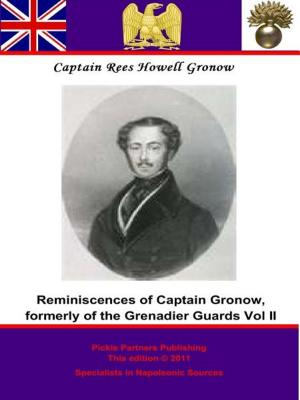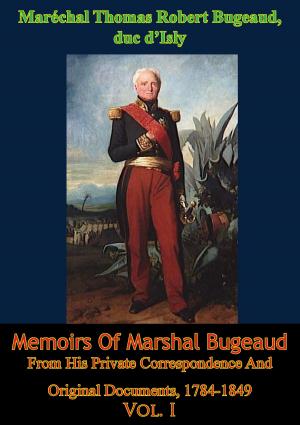History Of The War In The Peninsular And In The South Of France, From The Year 1807 To The Year 1814 – Vol. VI
Nonfiction, History, Spain & Portugal, France, Military| Author: | General William Francis Patrick Napier K.C.B. | ISBN: | 9781908902238 |
| Publisher: | Wagram Press | Publication: | August 16, 2011 |
| Imprint: | Wagram Press | Language: | English |
| Author: | General William Francis Patrick Napier K.C.B. |
| ISBN: | 9781908902238 |
| Publisher: | Wagram Press |
| Publication: | August 16, 2011 |
| Imprint: | Wagram Press |
| Language: | English |
A masterful, epic account of the Spanish Ulcer that drained Napoleon's resources and played a pivotal role in the end of his domination of Europe.
The author served with distinction in the actions of the Light Division, such as the epic march to Talavera, the battles of Fuentes d’Oñoro, Salamanca, Nivelle, Orthes and Toulouse. He left the service a General and Knight Commander of the Order of Bath. Napier’s History would rank as the most important history to be written by an actual participant, and was as controversial with his countrymen as amoung his contemporaries on the Continent.
In Napier’s concluding volume [End of 1813 – April 1814], he chronicles the last says of the first reign of Napoleon as Wellington forcefully shifts Marshal Soult from each position and passes each defensive line with great skill. Despite the successful battle of Orthez (or Orthes), Wellington is beset with problems, he has to dispense of the services of his Spanish allies, whose looting has become a liability, along with the millstone of their internal power struggle between Ferdinand, recently released by Napoleon to sow discord, and the ruling classes. Stripped of a large part of his manpower, he pushes onward, Wellington fights the controversial battle of Toulouse and in spite of mistimed attacks, and one of his best generals dis-obeying orders he pushes Soult further back into France. The timing of news of the abdication of Napoleon from Paris is the subject to much debate and is weighed by Napier in favour of Soult, and with the final action of the war, the sally from Bayonne the hostilities come to and end until the Hundred Days.
Also included in this volume but missing from the earlier editions are his defences, ripostes and counters to the carping and criticism of his initial publications, much of it emanating from Marshal Beresford stung by Napier’s harsh judgement of the battle of Albuera
A masterful, epic account of the Spanish Ulcer that drained Napoleon's resources and played a pivotal role in the end of his domination of Europe.
The author served with distinction in the actions of the Light Division, such as the epic march to Talavera, the battles of Fuentes d’Oñoro, Salamanca, Nivelle, Orthes and Toulouse. He left the service a General and Knight Commander of the Order of Bath. Napier’s History would rank as the most important history to be written by an actual participant, and was as controversial with his countrymen as amoung his contemporaries on the Continent.
In Napier’s concluding volume [End of 1813 – April 1814], he chronicles the last says of the first reign of Napoleon as Wellington forcefully shifts Marshal Soult from each position and passes each defensive line with great skill. Despite the successful battle of Orthez (or Orthes), Wellington is beset with problems, he has to dispense of the services of his Spanish allies, whose looting has become a liability, along with the millstone of their internal power struggle between Ferdinand, recently released by Napoleon to sow discord, and the ruling classes. Stripped of a large part of his manpower, he pushes onward, Wellington fights the controversial battle of Toulouse and in spite of mistimed attacks, and one of his best generals dis-obeying orders he pushes Soult further back into France. The timing of news of the abdication of Napoleon from Paris is the subject to much debate and is weighed by Napier in favour of Soult, and with the final action of the war, the sally from Bayonne the hostilities come to and end until the Hundred Days.
Also included in this volume but missing from the earlier editions are his defences, ripostes and counters to the carping and criticism of his initial publications, much of it emanating from Marshal Beresford stung by Napier’s harsh judgement of the battle of Albuera








![Cover of the book History Of The Consulate And The Empire Of France Under Napoleon Vol. VI [Illustrated Edition] by General William Francis Patrick Napier K.C.B.](https://www.kuoky.com/images/2016/march/300x300/9781786259134-gFGX_300x.jpg)






